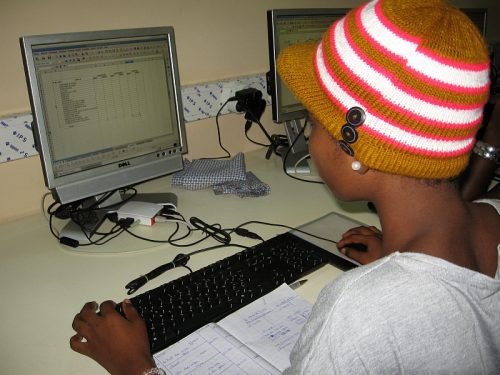Back in May 2013, we heard from Dominique Laloux about an exciting project to bring Raspberry Pi labs to schools in rural West Africa. Until 2012, 75 percent of teachers there had never used a computer. The project has been very successful, and Dominique has been in touch again to bring us the latest news.

Preparing the new Pi labs building in Kuma Tokpli, Togo
Growing the project
Thanks to the continuing efforts of a dedicated team of teachers, parents and other supporters, the Centre Informatique de Kuma, now known as INITIC (from the French ‘INItiation aux TIC’), runs two Raspberry Pi labs in schools in Togo, and plans to open a third in December. The second lab was opened last year in Kpalimé, a town in the Plateaux Region in the west of the country.

Using the new Raspberry Pi labs in Kpalimé, Togo
More than 400 students used the new lab intensively during the last school year. Dominique tells us more:
“The report made in early July by the seven teachers who accompanied the students was nothing short of amazing: the young people covered a very impressive number of concepts and skills, from the GUI and the file system, to a solid introduction to word processing and spreadsheets, and many other skills. The lab worked exactly as expected. Its 21 Raspberry Pis worked flawlessly, with the exception of a couple of SD cards that needed re-cloning, and a couple of old screens that needed to be replaced. All the Raspberry Pis worked without a glitch. They are so reliable!”
The teachers and students have enjoyed access to a range of software and resources, all running on Raspberry Pi 2s and 3s.
“Our current aim is to introduce the students to ICT using the Raspberry Pis, rather than introducing them to programming and electronics (a step that will certainly be considered later). We use Ubuntu Mate along with a large selection of applications, from LibreOffice, Firefox, GIMP, Audacity, and Calibre, to special maths, science, and geography applications. There are also special applications such as GnuCash and GanttProject, as well as logic games including PyChess. Since December, students also have access to a local server hosting Kiwix, Wiktionary (a local copy of Wikipedia in four languages), several hundred videos, and several thousand books. They really love it!”
Pi lab upgrade
This summer, INITIC upgraded the equipment in their Pi lab in Kuma Adamé, which has been running since 2014. 21 older model Raspberry Pis were replaced with Pi 2s and 3s, to bring this lab into line with the others, and encourage co-operation between the different locations.
“All 21 first-generation Raspberry Pis worked flawlessly for three years, despite the less-than-ideal conditions in which they were used — tropical conditions, dust, frequent power outages, etc. I brought them all back to Brussels, and they all still work fine. The rationale behind the upgrade was to bring more computing power to the lab, and also to have the same equipment in our two Raspberry Pi labs (and in other planned installations).”

Students and teachers using the upgraded Pi lab in Kuma Adamé
An upgrade of the organisation’s first lab, installed in 2012 in Kuma Tokpli, will be completed in December. This lab currently uses ‘retired’ laptops, which will be replaced with Raspberry Pis and peripherals. INITIC, in partnership with the local community, is also constructing a new building to house the upgraded technology, and the organisation’s third Raspberry Pi lab.
Reliable tech
Dominique has been very impressed with the performance of the Raspberry Pis since 2014.
“Our experience of three years, in two very different contexts, clearly demonstrates that the Raspberry Pi is a very convincing alternative to more ‘conventional’ computers for introducing young students to ICT where resources are scarce. I wish I could convince more communities in the world to invest in such ‘low cost, low consumption, low maintenance’ infrastructure. It really works!”
He goes on to explain that:
“Our goal now is to build at least one new Raspberry Pi lab in another Togolese school each year. That will, of course, depend on how successful we are at gathering the funds necessary for each installation, but we are confident we can convince enough friends to give us the financial support needed for our action.”

Reliable Raspberry Pis in the labs at Kpalimé
Get involved
We are delighted to see the Raspberry Pi being used to bring information technology to new teachers, students, and communities in Togo – it’s wonderful to see this project becoming established and building on its achievements. The mission of the Raspberry Pi Foundation is to put the power of digital making into the hands of people all over the world. Therefore, projects like this, in which people use our tech to fulfil this mission in places with few resources, are wonderful to us.
More information about INITIC and its projects can be found on its website. If you are interested in helping the organisation to meet its goals, visit the How to help page. And if you are involved with a project like this, bringing ICT, computer science, and coding to new places, please tell us about it in the comments below.
The post More Raspberry Pi labs in West Africa appeared first on Raspberry Pi.




















